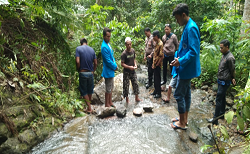KKN-PPM: Pemberdayaan Masyarakat Pengelolaan Sanitasi Air Bersih pada Kawasan Perdesaan Prioritas Nasional di Desa Loeha Kecamatan Towuti KKN-PPM: Empowerment of Clean Water Sanitation Management in the National Priority Rural Area in Village Loeha, Towuti Sub-district
Main Article Content
Abstract
Real Work Lecture Program-Community Empowerment Learning (KKN-PPM) STIKES Bhakti Pertiwi Luwu Raya Palopo is one of the community service activities carried out routinely by universities. The KKN PPM concept is intended to change the concept of "working for the community" to "working with the community". In addition, to improve its contextualization, KKN-PPM is carried out by changing the development paradigm into an empowerment paradigm. Purpose: The KKN-PPM activities are aimed at empowering and fostering the community to live healthy so that the health status of the village community can be fulfilled. The KKN-PPM implementation program is carried out using two models: the eco-e-development model, and the Center for Environment and Societal model. KKN-PPM activities have produced simple air filters in each hamlet in the village of Loeha with basic materials that can be obtained by residents in the village of Loeha. The incidence of diarrhea decreased or was not included in the list of most diseases in the working area of Bantilang Public Health Center. Increased knowledge and skills of the community about clean water sanitation management technology. It is expected that the level of public health in the village of Loeha can improve. Increase the soul of clean and healthy life, so that they can utilize a larger air source than a clean air source to save community life. The people of Loeha Village are very responsive to this activity, specifically, in making simple clean air filtration, this is evidenced by the considerable number of people present.
Downloads
Article Details
Authors who publish with this journal agree to the following terms:
- Any article on the copyright is retained by the author(s).
- Author grant the journal, right of first publication with the work simultaneously licensed under a Creative Commons Attribution License that allows others to share work with acknowledgment of the work authors and initial publications in this journal.
- Authors are able to enter into a separate, additional contractual arrangements for non-exclusive distribution of published articles of work (eg, post-institutional repository) or publish it in a book, with acknowledgment of its initial publication in this journal.
- Authors are permitted and encouraged to post their work online (e.g., in institutional repositories or on their websites) prior to and during the submission process, as can lead to productive exchanges, as well as earlier and greater citation of published work.
- The article and any associated published material is distributed under the Creative Commons Attribution-ShareAlike 4.0 International License
References
Ayuningrum, F.V., Salamah, M. 2015. Analisis Faktor Sanitasi dan Sumber Air Minum yang Mempengaruhi Insiden Diare pada Balita di Jawa Timur dengan Regresi Logistik Biner. Jurnal Sains dan Seni ITS. 4(2):223-228. http://dx.doi.org/10.12962/j23373520.v4i2.10799
Darmanto, R.F. 2018. Pengaruh Budaya Kerja, Disiplin Kerja Dan Koordinasi Terhadap Kinerja Karyawan PT Kereta Api Indonesia (Persero) Daop 1 Jakarta. Jurnal Pengembangan Wiraswasta. 20(2):79-94. http://dx.doi.org/10.33370/jpw.v20i2.216
Erica, D. 2016. Hubungan Dan Pengaruh Bimbingan Belajar Terhadap Prestasi Belajar Siswa Pada Sma Kafah Unggul Tangerang. Cakrawala: Jurnal Humaniora Bina Sarana Informatika. 16(1):1-13. https://doi.org/10.31294/jc.v16i1.1278
Food and Nutrition Research Institute. 2002. Recommended Energy and Nutrient Intakes Philippines, 2002 Edition. Manila: Food and Nutrition Research Institute Department of Science and Technology.
Gusdi, R. Wita, H., Septiana, U. 2017. Pembuatan Alat Penyaringan Air Sederhana Dengan Metode Fisika. Jurnal Nasional Ecopedon: JNEP. 4(1):19-21.
Moll, D.M., McElroy, R.H., Sabogal, R., Corales, L.F., Gelting, R.J. 2007. Health impact of water and sanitation infrastructure reconstruction programmes in eight Central American communities affected by Hurricane Mitch. Journal of Water and Health. https://doi.org/10.2166/wh.2006.047
Musawir, M.A., Arsin, A.A. 2014. Kontaminasi Bakteri Escherichia coli Pada Botol Susu Dengan Kejadian Diare Pada Bayi. Media Kesehatan Masyarakat Indonesia. 10(3):146-153. http://dx.doi.org/10.30597/mkmi.v10i3.487
Napitupulu, D.O., Damanik, I.R.T., Sitorus, E., Marta, E.D. 2017. Prevalensi Diare Pada Balita Di Puskesmas Sibiru-Biru Kecamatan Sibiru-Biru Deli Serdang Tahun 2015-2016. Jurnal Kedokteran Methodist. 9(9):728-733.
Nazarudin. 2016. Pengaruh Koordinasi Dan Pengawasan Terhadap Efektivitas Organisasi Di Lingkungan Pemerintahan Kabupaten Cianjur (Studi pada Sekretariat-sekretariat, Lembaga Teknis Daerah dan Dinas-dinas di lingkungan Pemerintahan Kabupaen Cianjur). Disertasi. Bandung: Universitas Pasundan.
Nurfita, D. 2017. Faktor-Faktor yang Berhubungan dengan Kejadian Diare pada Balita di Puskesmas Bulu Lor Kota Semarang. Kes Mas: Jurnal Fakultas Kesehatan Masyarakat. 11(2):149-154. http://dx.doi.org/10.12928/kesmas.v11i2.7139
Pemerintah Republik Indonesia. 2017. Instruksi Presiden Republik Indonesia Nomor 1 Tahun 2017 tentang Gerakan Masyarakat Hidup Sehat.
Raflis. 2015. Pengaruh Komunikasi Dan Tim Kerja Terhadap Keberhasilan Kolaborasi Desain Pada Konsultan Enjinering Di Yogyakarta, Solo, Dan Semarang. Tesis. Surabaya: Institut Teknologi Sepuluh November.
Raharjo, K., Mulyoto, M., Suryani, N. 2016. Pengaruh Penyuluhan Kesehatan terhadap Perilaku Hidup Bersih dan Sehat (PHBS) ditinjau dari Status Sosial Ekonomi (Studi Eksperimen Pada Mahasiswa Prodi DIII Keperawatan Poltekkes Bhakti Mulia Sukoharjo). Indonesian Journal on Medical Science (IJMS). 3(2):86-93.
Robertson, W., Stanfield, G., Howard, G., Bartram, J. 2007. Monitoring the Quality of Drinking Water During Storage and Distribution. In Dufour, A., Snozzi, M. Koster, W., Bartram, J., Ronchi, E., Fewtrell, L. (Eds.) Assessing Microbial Safety of Drinking Water: Improving Approaches and Methods. Paris: Organisation for Economic Co-operation and Development-World Health Organization.
Sukardi, D.K. 2000. Pengantar Pelaksanaan Program Bimbingan dan Konseling di Sekolah. Jakarta: Rineka Cipta.
Sutomo, S. 1987. Water Supply and Diarrheal Disease in Rural Areas of Indonesia. Buletin Penelitian Kesehatan. 15(2):9-14.
Utami, S., Handayani, S.K. 2017. Ketersediaan Air Bersih Untuk Kesehatan: Kasus Dalam Pencegahan Diare Pada Anak. In Pangaribuan, N., Winarni, I., Toha, M., Utami, S. (Eds). Optimalisasi Peran Sains & Teknologi untuk Mewujudkan Smart City. Jakarta: Universitas Terbuka.
